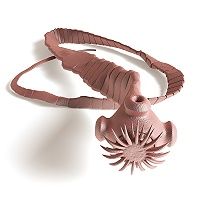Could Purposeful Worm Infection Cure Inflammatory Bowel Disease?
Inflammatory bowel diseases (IBD) may be countered with worm infection in the gut microbiome, according to successful mice and human studies presented in the journal Science.

Inflammatory bowel diseases (IBD) may be countered with worm infection in the gut microbiome, according to successful mice and human studies presented in the journal Science.
Researchers from the NYU Langone Medical Center argued that the absence of exposure to worms in a sanitary modern living space has left some individuals with over sensitive microbiomes that are vulnerable to IBD.
The researchers hypothesized that since worms have aided balance in immune systems throughout evolution in developing nations, where IBD rates are high, it would work as a training mechanism for vulnerable guts.
In mice affected by intestinal worms, the researchers observed as much as a thousand-fold decrease in the bacterial species linked to higher risk of IBD called bacteroides.
Additionally, the researchers reported that clostridia, known for countering inflammation, increased tenfold simultaneously. They believe that the worms trigger the growth of clostridia, which in turn either wiped out bacteroides for nutritional purposes or released toxins that destroy bacteroides.
The researchers, showed in a press release that their findings were the first to link parasites and bacteria to the origins of IBD and believed that their findings could be applicable in the future for diseases such as multiple sclerosis, rheumatoid arthritis, and type 1 diabetes.
The researchers also studied inhabitants of rural Malaysia (75 Orang Asli indigenous people), which is a region known for having low rates of IBD but high incidence of worm infections.
The researchers found more clostridia and fewer bacteroides in the microbiomes of those patients when compared to patients in a nearby urban area (20 people in Kuala Lumpur). Patients that were de-wormed demonstrated less clostridia and more bacteroides.
Mice that were lacking the gene NOD2, known for affecting IBD and other disorders, were fed between 10 and 15 parasitic whipworm eggs. When the worms matured, the study researchers examined the bacteroides and clostridia levels in the mice’s intestines and stool samples, in addition to the presence of IBD. With matured worms, nearly all bacteroides disappeared and IBD symptoms such as intestinal bleeding and ulceration went away, while clostridia levels increased.
“Our study could change how scientists and physicians think about treating IBD,” study co senior investigator Ken Cadwell, PhD said in the statement. “Patient testimonials and anecdotes lead many to think that worms directly cure IBD, while in reality, they act on the gut bacteria thought to cause the disease.”